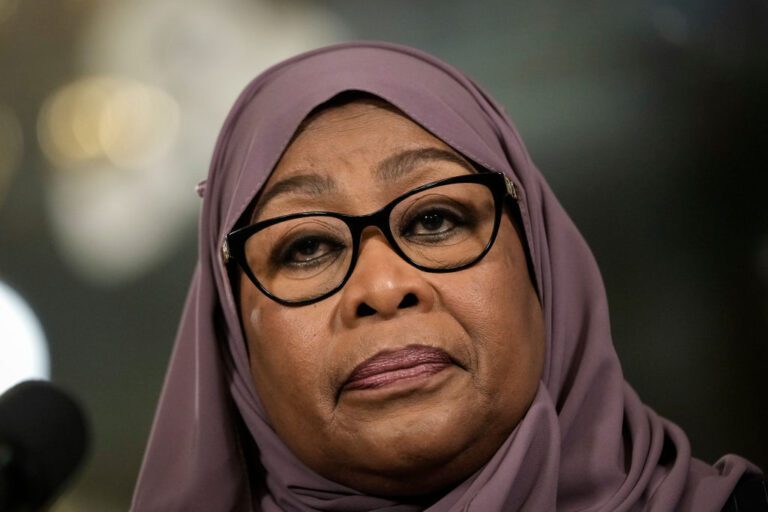U.S. Senate Foreign Relations Committee member Jim Risch has spoken out against President Samia Suluhu Hassan’s “brutal regime,” accused the government of intimidation and abductions of critics ahead of elections, and criticized Tanzania for targeting Christian leaders.
Senator Risch accused the country of silencing critics by “kidnapping critics, torturing detainees and imprisoning opponents” ahead of the October 29, 2025 general election.
“This crackdown is not only an attack on Christians and other citizens,” Sen. Risch wrote on X. “It threatens Tanzania’s stability, undermines U.S. security and economic interests, and risks pushing the country further into China’s embrace.”
The senator’s comments came after months of sustained threats against critics of President Hassan’s government.
Local news outlets reported that police have arrested a pastor from the Evangelical Lutheran Church of Tanzania (ELCT) on suspicion of inciting his followers not to participate in the upcoming elections. President Hassan is expected to win because the main opposition leader, Tundu Lissu, was arrested in April 2025 and has been in custody since then.
“The pastor was not abducted. He was detained by police on suspicion of inciting church members not to vote and is under investigation,” the newspaper quoted Regional Police Commander Ahmed Makarani as saying.
The news agency reported that police were searching for Sheikh Juma Sirima in Boai district on a similar charge of encouraging people not to vote.
Social media platforms have been flooded with unconfirmed reports of abductions and detentions of Christian leaders who opposed the government’s response to the political atmosphere in the country.
On April 30, unidentified assailants attacked Father Charles Kitima, secretary general of the Tanzanian Episcopal Church (TEC) and a vocal critic of human rights abuses, at the TEC headquarters in Kurasini, Dar es Salaam.
The incident was widely condemned by human rights groups and is believed to be related to his outspoken criticism of the government. Mr Kitima had in recent weeks denounced Mr Lissu’s detention as “illegal” and accused authorities of manipulating the electoral process.
“Stealing the people’s votes, introducing fake or invalid ballots, and declaring the winner the winner of someone who did not receive a majority of votes is evil and the work of the devil,” he said in one of his speeches.
Hours before the assault, a video of Mr Kitima criticizing “illegal practices” within Tanzania’s political system and calling on authorities to ensure free and fair elections went viral on social media.
After surviving the attack, he issued a statement encouraging people to “stand firm in defense of the nation’s fundamental issues” and “not be afraid to pay the price in defense of justice and national responsibility.”
Amnesty International has documented how political rights are being curtailed in the country in a report released on October 20, 2025, titled “Unopposed, Unchecked and Unjust: ‘Terror Wave’ Hits Tanzania Ahead of 2025 Vote.”
“Amnesty International has documented widespread abuses between January 2024 and October 2025, including enforced disappearances, arbitrary arrest, torture and other ill-treatment, and extrajudicial killings. Freedoms of expression, movement and peaceful assembly are severely restricted,” Amnesty International said.
The report said laws such as the Political Parties Affairs (Amendment) Act 2024, the Cybercrime Act and the Media Services Act have been used to criminalize dissent, censor media and control the digital space.
“A 24-year-old content creator has disappeared and another reported kidnapping and torture. Popular social media platforms that many Tanzanians seek information from, such as JamiiForums and X, have also been restricted and will remain banned during the election period,” the report added.
Amnesty International also described an alarming trend of abductions, enforced disappearances, and killings of critics of the state.
The Tanzanian government denied these claims, calling the Amnesty International report baseless and misleading, according to government spokesperson Gerson Msigwa.
pray for peace
At a special interreligious prayer meeting held on October 26, religious leaders and government officials called on people to vote on Election Day while ensuring peace in the country as civil society called for demonstrations on Election Day.
The Council of Pentecostal Churches in Kagera Region (CPCT) organized the prayer in collaboration with the Supreme Council of Tanzanian Muslims, Baraza Ku La Waislam Tanzania (BAKWATA). Among them were leaders of two religions who came to pray in preparation for the upcoming general election.
At the meeting, Bishop Elemes Magezi urged all Tanzanians to gather in large numbers and elect leaders while maintaining peace across the country.
At another interreligious prayer meeting in the Tabora region, religious leaders stressed the importance of maintaining peace and remaining united as a country after the general election.
Cardinal Protas Lugambwa said peace can move the country forward and the country should pursue unity.
Calls for peace and unity from religious leaders as voters prepare to cast their ballots stand in stark contrast to reports of harassment and intimidation that characterized the election period.
